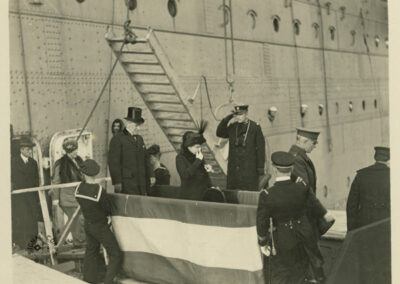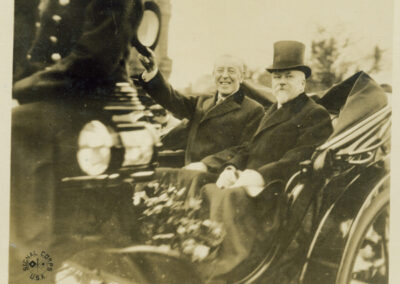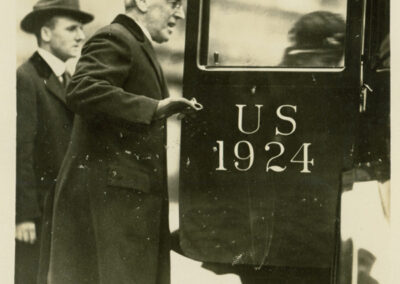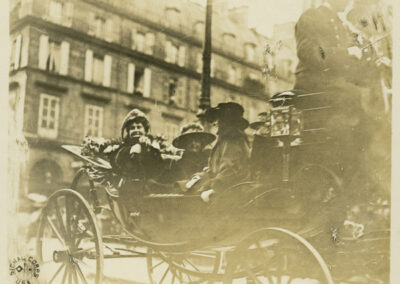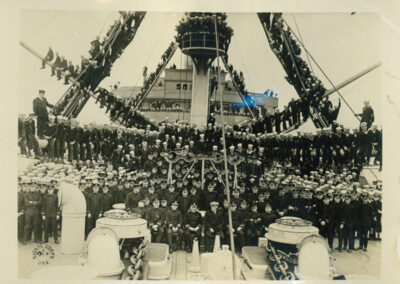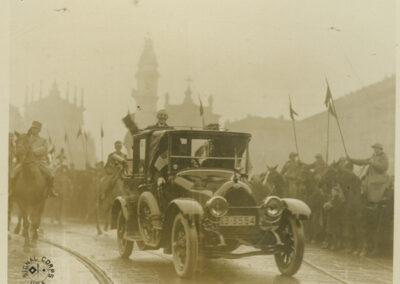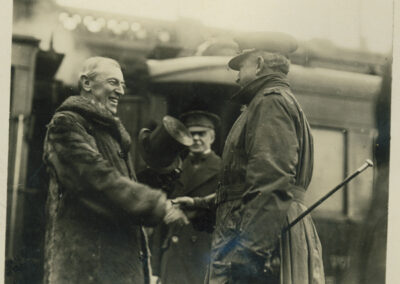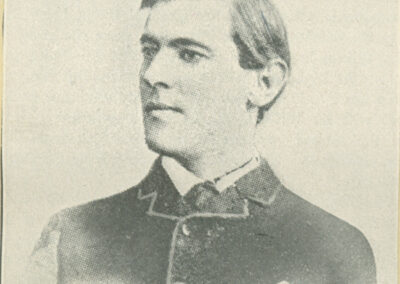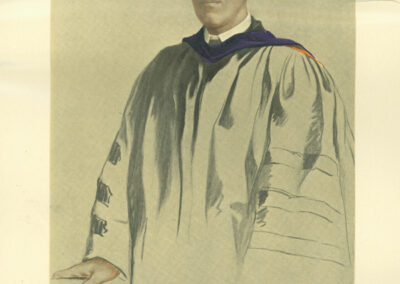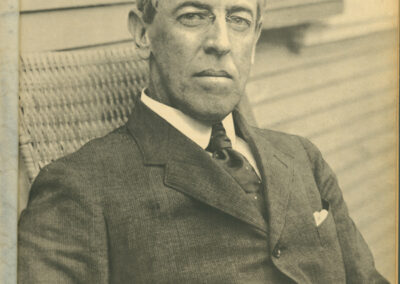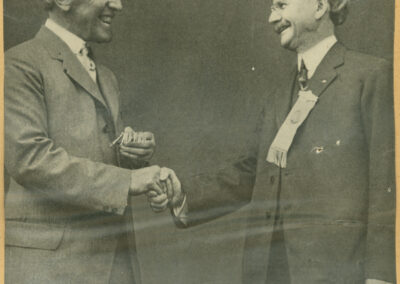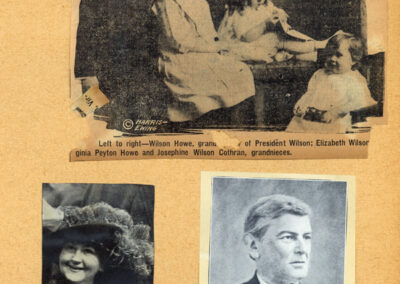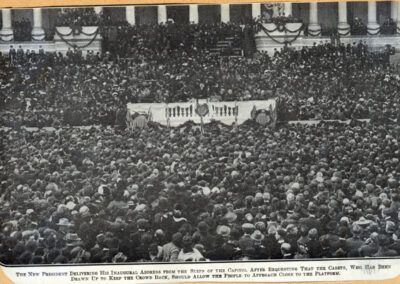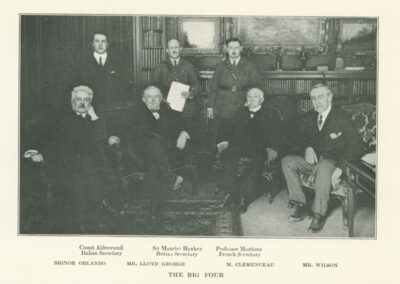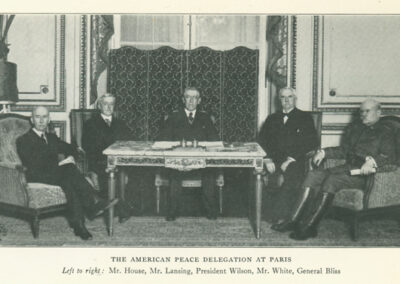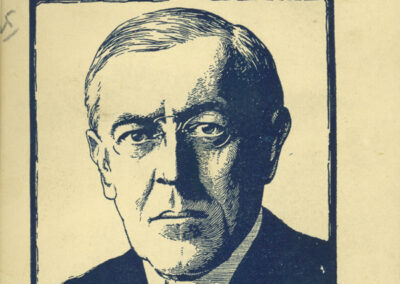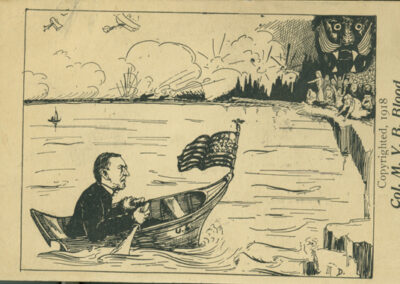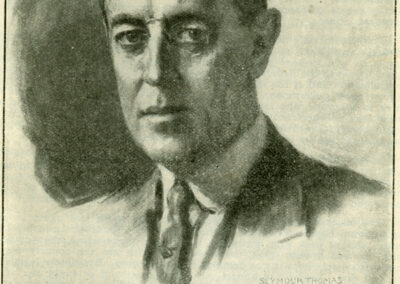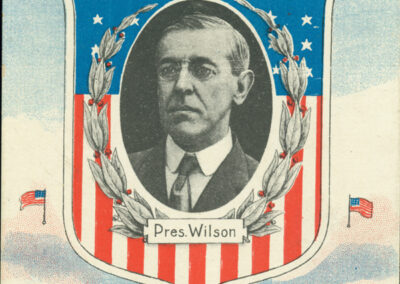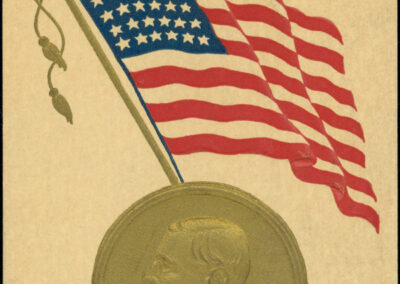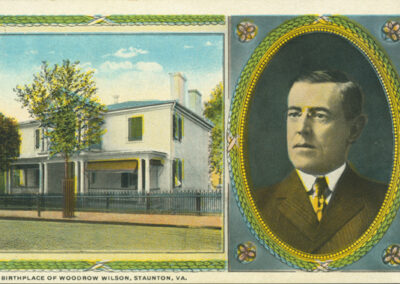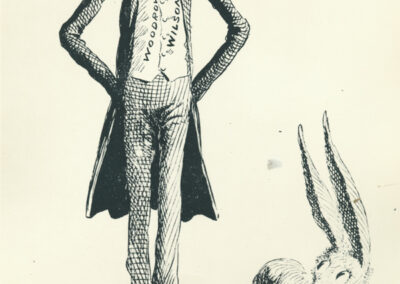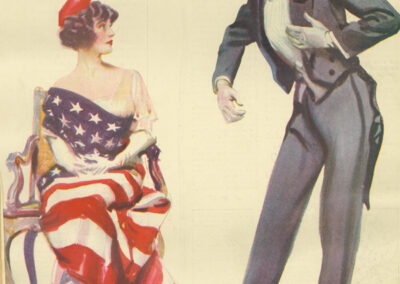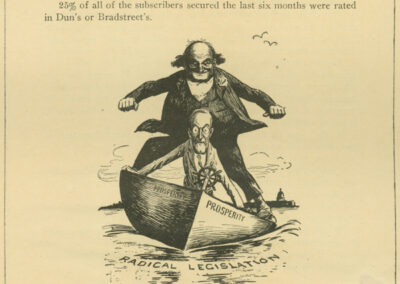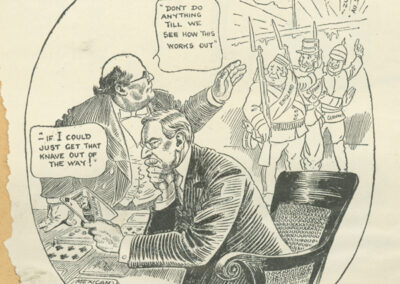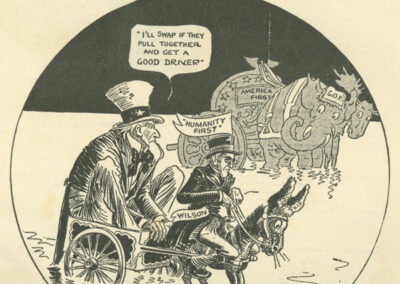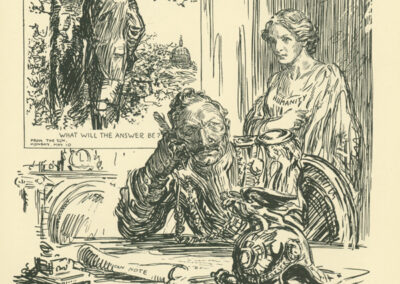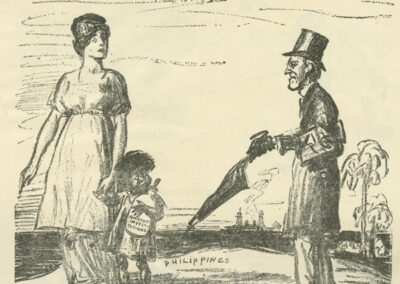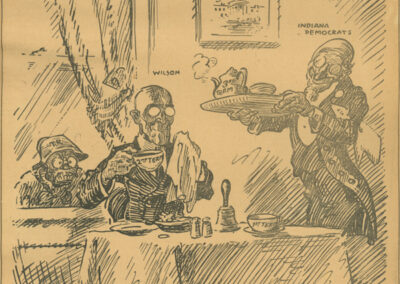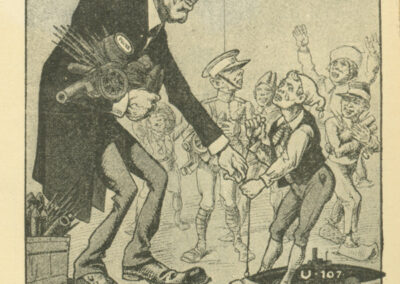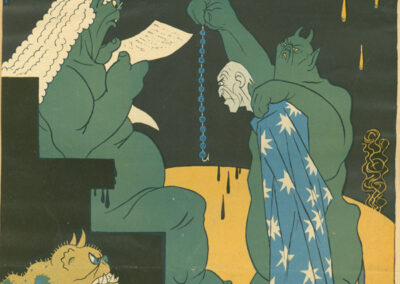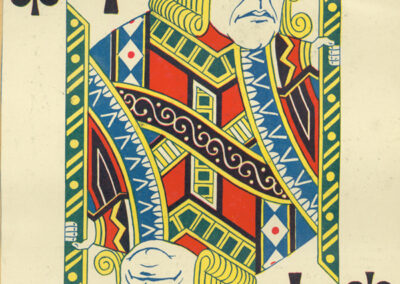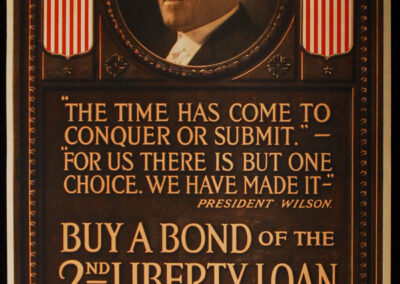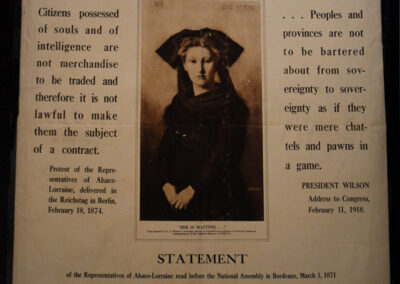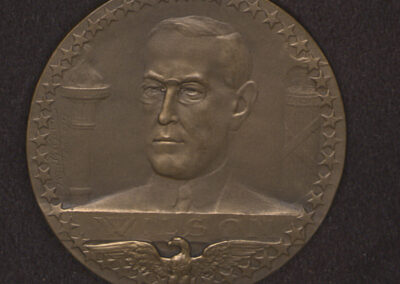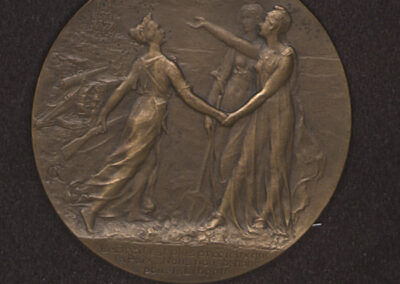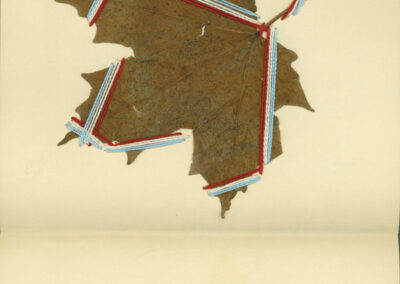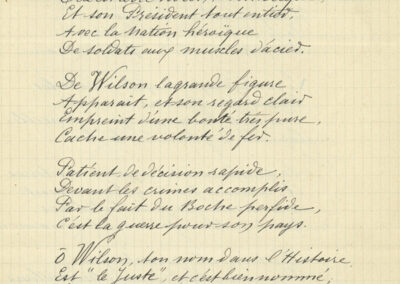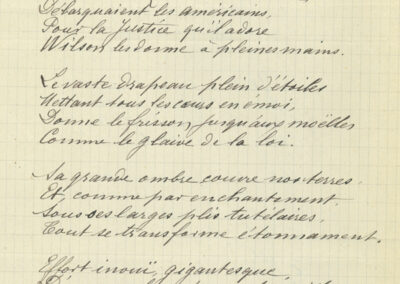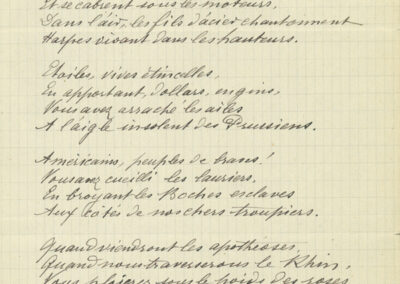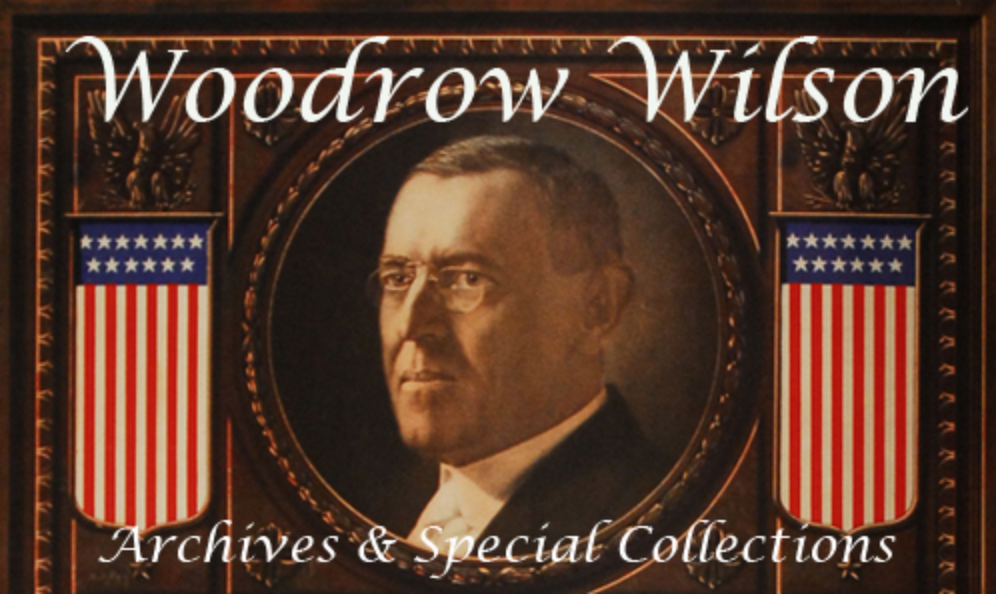
About This Exhibit
From 1913-1921, Woodrow Wilson was the American President, meaning he was one of the most powerful men in the world during one of the most significant periods in history. The University of Nebraska–Lincoln Libraries Archives & Special Collections is home to a variety of materials related to President Wilson, his leadership during World War I, and his involvement at the Paris Peace Conference.
This exhibit includes documents, items, and images from a number of different collections at the University of Nebraska and includes cartoons, books, postcards, posters, and photographs, along with a few miscellaneous items, all representative of President Wilson. Some of the items date back to Wilson’s schooling at Princeton, while the majority relate to his presidency, and more specifically, his involvement in World War I and the following Peace Conference at Paris in 1919. Also included is a bibliography of materials related to Woodrow Wilson which are also available in the Archives & Special Collections.
Through the variety of materials presented here, this project will make available a number of items housed in the University of Nebraska–Lincoln Libraries Archives & Special Collections in order to provide better insight into the life and presidency of Woodrow Wilson, as well as some of the issues which were prevalent during this time.
Biography
Thomas Woodrow Wilson was born in 1856 in Staunton, Virginia to a Presbyterian minister, Dr. Joseph Wilson, and Janet Woodrow and was the third of four children. His father served in the Civil War as a chaplain with the Confederate army, and during the war, his church was used as a military hospital.
Wilson began his post-secondary education at Davidson College in North Carolina but, after a year, transferred to Princeton where he graduated from in 1879. He attended law school at the University of Virginia for one year but did not graduate and, in 1882, joined a University of Virginia classmate in his newly begun law practice. The practice was unsuccessful, and led Wilson to turn away from a career in law. He returned to school at John Hopkins University and earned his PhD in history and political science in 1886. His doctoral thesis, Congressional Government: A Study in American Politics, was published in 1885 and challenges the separation of the legislative and executive powers in America by comparing it with parliamentary government. The same year he married Ellen Louise Axson.
He taught at Bryn Mawr College and Wesleyan University before joining, and eventually becoming president of, Princeton University in 1902 where he became known for his ideas on education reform. In 1911 Wilson entered the political sphere as the Governor of New Jersey, bringing him a great deal of political acclaim. He won the 1912 presidential election by a landslide with the Republican ticket split between William Howard Taft and Theodore Roosevelt. In 1914, his wife Ellen passed away, and Wilson was remarried to Edith Bolling Galt in December 1915. His second Presidential term was won by a much closer margin. He realized that the United States could no longer remain neutral in the war, and the nation officially entered World War I in April of 1917. It consumed his second term as President.
Over the course of his presidency, Wilson passed many significant pieces of legislation, with some of the most notable being the Federal Trade Commission, the Clayton Antitrust Act, the Underwood Tariff, the Federal Farm Loan Act, and the Federal Reserve System.
Photos from the Paris Peace Conference
The Wilsons exit the S. S. George Washington
President Woodrow Wilson and his wife Edith exit the S.S. George Washington upon arrival in France for the Paris Peace Conference at Versailles. RG 12/14/12
Wilson in a Carriage in France
A carriage carries President Wilson and French President Poincare as they greet the crowd on a ride through the city. RG 12/14/12
Woodrow and Edith Wilson Enter an Auto
President Wilson holds open an automobile door for Edith Wilson at Quai d’Orsay in Paris. RG 12/14/12
Wilson on a Naval Ship in France
President Wilson sits front and center, posed on a ship among the Navy at this base in France. RG 12/14/12
Wilson Stands in His Vehicle
President Wilson stands in his vehicle while men on horses line the streets and escort him through Paris. RG 12/14/12
Portraits and Scrapbook Images
Sketch of Princeton President Wilson
Woodrow Wilson in his robe as President of Princeton University. MS 50
Portrait of Wilson
Portrait of Woodrow Wilson at time of his candidacy for Governor of New Jersey. MS 50
President Elect Wilson
President Wilson shakes the hand of newly elected Vice-President Thomas Marshall. MS 50
Family Scrapbook
This scrapbook page shows a collection of various clippings of President Wilson’s family. They include his grandchildren (top), with a caption that says, “Left to right-Wilson Howe, grandchildren of President Wilson; Elizabeth Wilson [unclear]ginia Peyton Howe and Josephine Wilson Cohran, grandnieces,” his wife (bottom left) with a caption that says, “The happpiest Woman in Washington on March 4. The new mistress of the White House,” and his father (bottom right) with a caption that reads, “Woodrow Wilson’s father, the Rev. Joseph R. Wilson, who was professor at Hampden Sidney College, VA. and a Presbyterian minister.” MS 50
Media Depictions of Wilson
Inaugural Address Crowd
The large crowd at President Wilson’s First Inaugural Address in 1912. The caption says, “The New President delivering his Inaugural Address from the steps of the Capitol after requesting that the cadets, who had been drawn up to keep the crowd back, should allow the people to approach close to the platform.” MS 50
The Big Four Peace Confrence
Image taken from The Big Four and Others of the Peace Conference by Robert Lansing. Back row: Count Aldrovandi (Italian Secretary), Sir Maurice Hankey (British Secretary), and Professor Mantoux (French Secretary). Front row: Vittorio Orlando of Italy, Georges Clemenceau of France, David Lloyd George of Britain, and American President Woodrow Wilson.
American Peace Delegation at Paris
Image taken from Robert Lansings book, The Peace Negotiations: A Personal Narrative. Left to right: Mr. House, Mr. Lansing, President Wilson, Mr. White, General Bliss
Cover of Biography
Image of President Wilson on the title page of President Wilson: His Problems and His Policy by Henry W. Harris.
Wilson rowing towards Europe
Postcard with a cartoon of President Wilson rowing towards the shore of a distressed Western Europe.
Cover page of Wilson’s speech
Image of Woodrow Wilson and his signature from the cover of his published speech, “A Friend of Immigration: Speech of Governor Wilson to Delegation of Editors of Newspapers Published in Foreign Languages” (1912).
Wilson’s message to congress
Postcard with a portrait of President Wilson along with a quotation from his April 2, 1917 message to Congress. MS 50
Stand by Them Both Postcard
Postcard calling for American Patriotism and the support of President Wilson. MS 50
Wilson and original home in Virginia
Postcard with an illustration of Woodrow Wilson as well as his original home in Staunton, Virginia. MS 50
A Difficult Dance
This cartoon of President Wilson is indicative of the general feeling of Americans concerning the tariff. MS 50
Boat of Prosperity
The cartoon in the middle of this page shows Wilson attempting to hold steady the boat of Prosperity while navigating through “radical” waters. MS 50
A Game of Patience
This cartoon from the Chicago Tribune depicts President Wilson struggling with what to do in Mexico, while countries in Europe cry for help. MS 50
Humanity First Cartoon
This cartoon from the Chicago Tribune reflects the positions of the different political parties going into their respective conventions before the 1912 presidential election. The Republican party had many supporters but was divided with the creation of Teddy Roosevelt’s Progressive party, ultimately leading to Wilson’s victory. MS 50
The Lusitania Crisis
This cartoon represents both struggle and patience over the decision of how to respond to “THE LUSITANIA CRISIS” in 1915. From “One Hundred Cartoons by Cesare”
The Filipino Waif Cartoon
Cartoon from the New York Tribune that reflects an opinion of President Wilson’s attitude towards American interests in the Philippines. MS 50
3rd Term Cartoon
Cartoon from the June 21, 1918 issue of the New York Evening Post. Shows Indiana Democrats serving Wilson a third term as president while he continues to “sip” on his second. Theodore Roosevelt peers anxiously through the window behind him. MS 50
Germany’s Reply Cartoon
This cartoon which originally appeared in a Zurich, Switzerland publication, Nebelspalter, depicts Germany as a whining child while President Wilson takes all of their weapons or “toys” away. MS 50
Wilson Before His Judge
This German cartoon called “Wilson Before His Judge” depicts a large, green, devilish judge reading a letter from President Wilson. Translation: Wilson says “I wanted to save the world.” The Judge responds, “But you have brought it about, allowing Germany to be nailed to a cross (can also be translated as ‘hit with clubs’).” The hook, dangling in front of Wilson with numbers 1-14 attached, symbolizes Wilson’s Fourteen Points. MS 50
Miscellaneous Exhibit Items
Alsace-Lorraine conflict poster
Poster addressing the issue between Prussia and France of the Alsace-Lorraine region. The image in the center, titled “SHE IS WAITING…,” is accompanied by a caption which reads: “Reproduction of J.J Henner’s painting offered to Gambetta by a group of Alsation women in remembrance of the National Defense of 1870-71.” 48.5 x 33 in. MS 126
Medal with Wilson’s Face
When America entered the conflict, many medals were struck showing the face of President Woodrow Wilson. This one shows the bust of Wilson, with a torch on the left, inscribed “Liberty” and faces on the right inscribed “Law.” The American eagle appears below, and the entire picture is encircled by 47 stars. Mss 43
Medal with three figures of France, England, and America
The reverse side shows France, England, and America all personified by female figures. France points to devastated fields and a cathedral in flames. On the bottom is the inscription “Right is more precious than peace.”
Poem about Wilson by UNL professor Fredrick M. Fling
Page 1
Translation America is with us And its President as a whole The heroical nation Of soldiers with muscles of steel. Of Wilson the great figure Appears, and his clear vision Imprint of a very pure kindness Hides an iron will Patient, of rapid decision In front of the accomplished crimes, By the effect of a perfidious Boche It is war for his country. O Wilson they name in the History Is “the Just” and it is well named Is there a better title of glory Than to defend a nation oppressed? From the north came Hope From the extreme south to Greenland The world has marched for France That a ruffian wanted to destroy.
Page 2
Translation: To the Allies of my native Country Of whom each country is a friend That comes and brings us its life To each one I say “Grand Merci” But in the horizon at dawn The Americans disembarked For the Justice that they adore, Wilson gives them by the handful The vast flag full of starts Putting the hearts in anxiety Gives thrills to the marrow Like the sword of the law. Its great shade covers our land. And like by enchantress Under its large tutelar folds All is transformed wonderfully. Unheard and gigantic efforts Of good blood amongst the best, Against the vile soldiery Of all a nation of robbers And from the ground, appears small boroughs Factories, and Immense camps Telegraph, Bombs, and grenades And of big soldiers, good children
Page 3
Translation: Its phalanx covers our roads The cannons, the railroads And the tanks, mobils, redoubts. Are brought to us by the sea. Its planes while climbing shakes And prance under their motors In the air the steel wires sing Living harps of the heights. Stars, living sparks While bringing dollars and engines You have pulled the wings Of the insolent eagle of the Prussians Americans nation of braves You have gathered the laurels While crushing the slave Boches At the side of our dear troopers When the apotheosis will come When we will cross the Rhine You will stoop under the weight of roses That are thrown to the winners at the end.
Bibliography
Books
Baker, Ray S. Woodrow Wilson: Life and Letters. Vol. 1-3. Garden City, NY: Doubleday, Page & Co., 1927.
Creel, George. Wilson and the Issues. New York: The Century Co., 1916.
Farmer, Frances, ed. The Wilson Reader. New York: Oceana Publications, 1956.
Harris, Henry W. President Wilson; His Problems and His Policy. London: Headley Bros., Ltd., 1918.
Lansing, Robert. The Big Four and Others of the Peace Conference. Boston: Houghton Mifflin Company, 1921.
Lansing, Robert. The Peace Negotiations, a Personal Narrative. Boston: Houghton Mifflin Company, 1921.
Seymour, Charles. Woodrow Wilson and the World War; a Chronicle of our own Times. New Haven: Yale UP, 1921.
Tumulty, Joseph P. “The Tribute of a Friend: an Address Delivered At Bethesda, Maryland, Thursday, October 28, 1920.” New York: Harper & Bros., 1920.
Tumulty, Joseph P. Woodrow Wilson as I Know Him. Toronto: Doubleday, Page & Company, 1921.
“Two Notable Articles About Woodrow Wilson.” The New York World and the New York Times. New York: 1911.
Wilson, Woodrow. On Being Human. New York: Harper & Brothers, 1916.
Wilson, Woodrow. The Present Task of Ministry. New York: Association Press, 1918.
Wilson, Woodrow. “The State and Federal Governments of the United States. a Brief Manual for Schools and Colleges.” Boston, New York: D. C. Heath & Co., 1889.
Speeches
Wilson, Woodrow. “Address of Woodrow Wilson Governor of New Jersey before the Iroquois Club.” Hotel La Salle, Chicago, Illinois.: 12 February 1912.
Wilson, Woodrow. “Address of Woodrow Wilson, President of the United States to The League to Enforce Peace at Washington, May 26, 1916.” New York: 1916.
Wilson, Woodrow. “A Friend of Immigration: Speech of Governor Wilson to Delegation of Editors of Newspapers Published in Foreign Languages.” National Arts Club, New York.: 4 September 1912.
Wilson, Woodrow. “Speech of President Woodrow Wilson Accepting the Nomination for President by the Democratic Party Together with Address of Notification by Senator Ollie M. James of Kentucky.” Shadow Lawn, New Jersey.: 2 September 1916.
Wilson, Woodrow. “Woodrow Wilson’s Speech of Acceptance of the Nomination for President of the United States by the Democratic Party.” Sea Girt, New Jersey.: 7 August 1912.
Credits
This exhibit was originally written and created in 2008 by Sarah Dieter for the UNL Archives & Special Collections. It was updated for WordPress in 2023 by Ellie Russell thanks to the Schmidt Family Library Internship.

